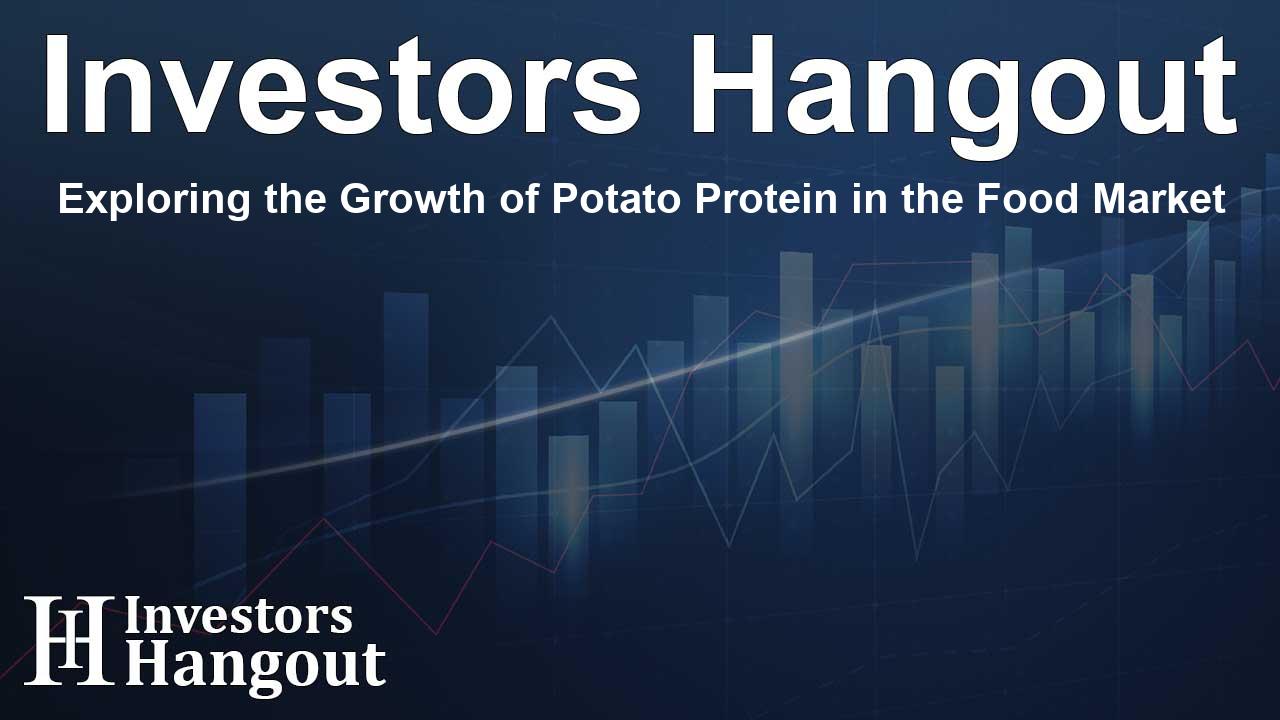Exploring the Growth of Potato Protein in the Food Market

The Rise of Potato Protein in Plant-Based Diets
Potato protein is rapidly gaining traction as the world embraces more plant-based diets. With an increasing number of individuals opting for vegan and vegetarian lifestyles, the demand for sustainable and nutritious protein sources is at an all-time high. It’s not just a trend, but a significant shift toward healthier eating habits and environmentally friendly products.
Why Choose Potato Protein?
Complete Nutritional Profile: Unlike many plant proteins, potato protein boasts a complete amino acid profile, making it an excellent alternative to traditional animal proteins. This quality is crucial for those looking to fulfill their protein requirements without relying on meat.
Sustainability at Its Core: One of the remarkable aspects of potato protein is its sustainability. Derived from potato byproducts, it effectively reduces food waste while also lessening its environmental footprint when compared to the production of many animal-based proteins.
Ideal for Allergy-Friendly Diets: For individuals with dietary restrictions, potato protein comes as a relief. It is free from common allergens such as soy, gluten, and dairy, providing a versatile option for everyone.
Versatility in Food Applications: The versatility of potato protein allows it to be incorporated into a wide range of food products. From meat alternatives to dairy-free beverages, the potential applications are vast and exciting.
Leading Players in the Potato Protein Sector
When examining the growth of potato protein, it's essential to look at the key players shaping the industry. Top companies instrumental in developing this market include:
- Avebe
- Tereos
- Kerry Group PLC
- Sudzucker AG
- Roquette Freres
- Emsland Group
- KMC Ingredients
- Pepees Group
- AKV Langholt
- PPZ Niechlow
- The Scoular Company
- Finnamyl
- Kemin Industries
- Bioriginal
- Duynie
Challenges and Opportunities
Despite the promising future of the potato protein industry, challenges remain. Key production costs and supply chain logistics need addressing. However, as technology advances and consumer awareness grows, the outlook appears optimistic. Investments are expected to increase in new production facilities, which will play a pivotal role in meeting the surging demand.
Additionally, the North American potato protein market is booming. Factors such as the increasing interest in plant-based diets and the nutritional benefits of potato protein are significant drivers of this growth. Potato protein is recognized for being a high-quality source, essential not only for food applications but also in sports nutrition and supplements.
The Future of the Potato Protein Industry
Looking ahead, potato protein is set to expand in various regions, particularly in Asia Pacific, where there is a notable rise in veganism. Production and awareness continue to be vital factors in the market's evolution. Industry stakeholders are anticipated to focus on overcoming challenges linked to competition from other proteins and enhancing the visibility of potato protein's advantages.
What to Expect Going Forward:
- Innovation in Plant-Based Foods: A broader selection of products utilizing potato protein will emerge, ranging from innovative meat substitutes to dairy alternatives.
- Enhanced Marketing for Health: As the health benefits of potato protein become more recognized, expect a shift in marketing strategies connecting these benefits to wellness.
- Sustainable Practices: Companies will increasingly adopt sustainable methods to ensure their production processes have minimal environmental impact.
In conclusion, the trajectory for potato protein is promising, as it is well-poised to become a significant player in the global protein market. The rise of plant-based diets signifies a new era in food consumption where sustainability and health are prioritized.
Frequently Asked Questions
What is potato protein?
Potato protein is a high-quality plant protein derived from potato byproducts, offering a complete amino acid profile and suitable for various dietary needs.
Why is potato protein sustainable?
Potato protein is sustainable because it is produced from waste byproducts of potato processing, reducing overall food waste and environmental impact.
Who are the main companies in the potato protein industry?
Key companies include Avebe, Tereos, and Kerry Group PLC, among others, all contributing to the growth and development of potato protein.
What challenges does the potato protein market face?
Challenges include high production costs, supply chain issues, and competition from other protein sources like soy and dairy.
What trends are shaping the future of potato protein?
The future is influenced by rising demand for plant-based foods, increased health awareness, and a focus on sustainable food systems.
About The Author
Contact Hannah Lewis privately here. Or send an email with ATTN: Hannah Lewis as the subject to contact@investorshangout.com.
About Investors Hangout
Investors Hangout is a leading online stock forum for financial discussion and learning, offering a wide range of free tools and resources. It draws in traders of all levels, who exchange market knowledge, investigate trading tactics, and keep an eye on industry developments in real time. Featuring financial articles, stock message boards, quotes, charts, company profiles, and live news updates. Through cooperative learning and a wealth of informational resources, it helps users from novices creating their first portfolios to experts honing their techniques. Join Investors Hangout today: https://investorshangout.com/
The content of this article is based on factual, publicly available information and does not represent legal, financial, or investment advice. Investors Hangout does not offer financial advice, and the author is not a licensed financial advisor. Consult a qualified advisor before making any financial or investment decisions based on this article. This article should not be considered advice to purchase, sell, or hold any securities or other investments. If any of the material provided here is inaccurate, please contact us for corrections.
